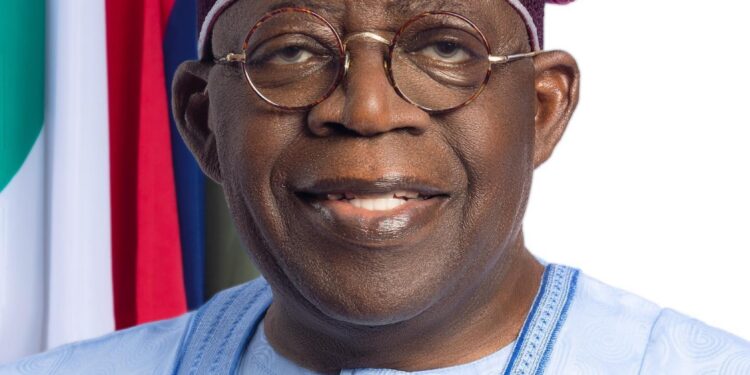Nigerian President, Bola Ahmed Tinubu, has affirmed that the practice of exporting mined crude ores out of the country will no longer hold sway as he reiterated his administration’s commitment to develop and unlock the sector’s rich potentials through value addition.
President Tinubu stated this in Abuja Tuesday while officially declaring open the 8th edition of the Nigerian Mining Week themed: “Capitalising on Nigeria’s Critical Mineral Resources for its Economic Growth.”
Represented by the Secretary to the Government of the Federation (SGF), Senator George Akume, the President said the resolve of the federal government to maximise the potentials of the mining industry and enhance its contribution to the revenue of government informed the remodelling of the former Ministry of Mines and Steel Development into Ministry of Solid Minerals Development and Ministry of Steel Development to enable them focus well.
He said that having observed the huge losses recorded by the nation to the export of crude mineral commodities over the years, the government has therefore evolved a policy on value addition to it’s mineral resources before exploitation.
“The policy will ensure that the teeming youth in the country will also be meaningfully absorbed in economic ventures that will empower them while developing their skills in specific areas of human endeavor as well as serve as a source of generation of the much needed foreign exchange for the country.
“Through this policy, the era of export of crude minerals from Nigeria is gone,” Tinubu noted, describing the theme of this year’s Mining week as one that underscores the government’s commitment to sustainable development, investments and cooperation within the mining industry with special focus on maximising Nigeria’s mining potential.
And as part of efforts to derisk the sector, the President also unveiled a new geological map which is an outcome of the government sponsored exploration project tagged NIMEP, supervised by the Nigerian Geological Survey Agency (NGSA), in collaboration with the ministry and other relevant stakeholders, that provides data on solid minerals across the country, for mining investments.
In his address earlier, the Minister of Solid Minerals Development, Dr. Dele Alake, had toed the path of the President on value addition to maximise the potentials of the sector by saying that government’s focus on the sector now goes beyond extraction of the minerals to value addition along the value chain.
“Our vision for the Mining Sector transcends mere resource extraction. We are firmly committed to conducting mining activities that are environmentally sustainable, socially responsible, and economically beneficial. We believe mining operations should serve as catalysts for community development and job creation and adhere to industry best practices that minimize ecological footprint.
“As we promote responsible and developmental extraction, we propagate value addition across the value chain as the essential principle of mineral development,” he said.
Rock Post recalls that a few weeks back, the Minister unveiled a 7-point Transformation Agenda which focuses on the establishment of a National Mining Company; development of big, standardised, and internationally certified mineral data base; formalisation of artisanal mining through co-operatives among several others.
This, Alake said, is in demonstration of “Mr. President’s unwavering commitment to the development of the Nigerian Mining Sector as a significant source of economic diversification of the country’s monolithic revenue base.”
On his part, the Minister of Steel Development, Prince Shuaibu Abubakar Audu, harped on the indispensable role of steel resources in infrastructure development – one critical area that the mining sector, like most others in the economy, is in dire need of.
He said: “Allow me to emphasise the pivotal role of the steel sector in this journey towards revitalising our economy. Steel, as we know, is the backbone of industrialisation. It is a core ingredient for infrastructure development, manufacturing, and construction.
“Our commitment to developing the steel sector is unwavering because it holds the potential to create numerous jobs, attract investments, and contribute significantly to our Gross Domestic Product (GDP).
“It is on this heel that we have set out motions to diversify Nigeria’s economy and attract Foreign Direct Investment (FDI) by transforming the Ajaokuta Steel Company Limited (ASCOL) complex into a Free Trade Zone, and designation of 24,000-hectare land of Ajaokuta as an Industrial Park.
“This strategic initiative aims to revitalise the steel industry, create jobs, and stimulate economic growth in the region, thus creating an industrial park in the ancient city of Ajaokuta,” he said.
From the National Assembly, Chairman of the Senate Committee on Solid Minerals, Sen. Osita Ngwu, who gave a good will message alongside other dignitaries, stressed the need to adopt a pragmatic approach and do the ‘action’ rather than the ‘talking’ in the quest to develop the mining sector, adding it had been done the other way round, over the year, and that was the factor in the failure of the sector.
He pledged the Red Chamber’s support for the Minister and other stakeholders in terms of legislative interventions that would facilitate the realisation of Nigeria’s dream of becoming a mining destination of the world.
“Moving away from the current situation is in the best interest of our Nation. If this sector, for instance, overtakes the oil sector (and this is the least that will happen when we get it right), it means that posterity will be kind to us and our children unborn.
“As a committee in the Upper Legislative Chambers, we pledge to work harmoniously and assiduously with the Minister, MDAs, NGOs, Security Agencies, and other stakeholders in making Legislative interventions that would make the national prosperity happen,” he said.



